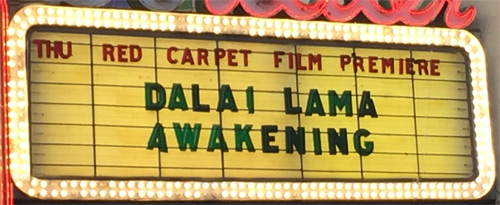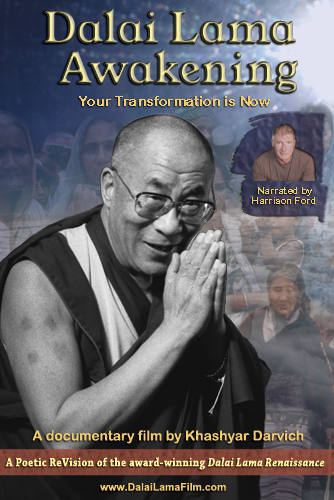The Chinese government wasted no time in denouncing the visit by the Dalai Lama to Taiwan this week. Their strong words and denunciation of the Nobel Prize winner and exiled leader comes on the heels of another very public and intense reaction from Chinese officials after a documentary film about the Dalai Lama entitled “Dalai Lama Renaissance,” narrated by Harrison Ford (www.DalaiLamaFilm.com), was released in theaters in Taiwan this summer, and received front page press in the Chinese language Taiwanese newspapers. The response, in both cases, indicates that China is taking a very hard stance on the issue of the Dalai Lama and Tibet and in fact may even be intensifying its response.
According to a published report on CNN, “Beijing opposes the visit in whatever form and capacity,” a spokesman for the State Council Taiwan Affairs Office said, according to Xinhua, which did not name the spokesman. “Under the pretext of religion, (the Dalai Lama) has all along been engaged in separatist activities,” he said.
China’s stance on both Taiwan and Tibet are subjects of international controversy as the Chinese government considers both countries to be a part of China despite what residents of those countries feel. And it feels the Dalai Lama is a symbol and instigator of international opinion against China as relates to Tibet. So it did not hesitate in what it sees as interference by the Dalai Lama in another of its concerns. Apparently, even a film about the Dalai Lama is not welcome in Taiwan, at least to the Chinese government.
After an overwhelmingly positive response from audiences at screenings in Taiwan, The People’s Daily, a daily newspaper and media arm of the Central Committee of the Communist Party of China sharply criticized “Dalai Lama Renaissance” in an article in its online edition.
In the article posted July 14th in the People’s Daily Online entitled “Western Movies Build Grand and Perfect Image of Dalai Lama,” The People’s Daily writes: “In recent years, a wave of ‘Dalai Lama fever’ has appeared in the Western movie industry… describing the Chinese government’s peaceful liberation of Tibet as ‘cruel oppression,’ and depicting the Dalai Lama’s life in India as difficult.”
Referring to “Dalai Lama Renaissance,” the article states “The part of the movie related to the peaceful liberation of Tibet was filled with political bias, reflecting the director’s ignorance and misunderstanding of Tibet’s history… The movie transforms the Dalai Lama into an omniscient sage, reflecting a “misunderstanding” of the Dalai Lama’s image in the West…In fact, what these movies depict is just the ‘anesthesia’ given by the Dalai Lama to the West…”
Although the title of the article refers to “movies,” the article exclusively focuses on “Dalai Lama Renaissance” and tries to discredit the Producer-Director of the film, Khashyar Darvich. The writer claims that the director is a devotee of the Dalai Lama. “Director Khashyar Darvich has long boasted that he is a follower of the Dalai Lama,” he writes . He supports this assertion by referring to an interview where Darvich mentioned that he shot the film to be able to spend time with the Dalai Lama.
“It’s interesting that the Chinese Communist Party refers to me as a follower of the Dalai Lama,” Darvich responded. “Although I respect the Dalai Lama as a man of peace, just as the Nobel Peace Prize Committee did by awarding him the Nobel Peace prize, and as do most governments around the world, I am not a Dalai Lama groupie. When I began the film, I was not very familiar with the Dalai Lama. I think that his actions, and the respect that he garners around the world, speaks for itself.”
The fact that the Chinese Communist Party’s main media organization has chosen to criticize the film may be a reaction to the very positive press the “Dalai Lama Renaissance” received in the Chinese language press in Taiwan, where it premiered in front of sold-out audiences in Taipei on June 1. And it may be an attempt to counteract any effect on readers in mainland China, who often have access to Chinese language news from Taiwan, particularly since the reviews and articles in major Chinese language newspapers in Taiwan have been very positive.
Taiwan’s best-selling weekly newspaper, E Weekly, gave the film a rating of 82, which is the highest rating a film has received in the past year from its Taiwanese theatrical distributor, Blockbuster of Taiwan (no relation to Blockbuster video stores in the U.S). According to Bockbuster of Taiwan, E Weekly regularly gives films far lower ratings. FTV, a television station in Taiwan, also reported that that the premiere of the film in Taiwan was very successful, with not an empty seat in the cinema. Taipei Time wrote of the documentary, “the film rapidly grabs hold of you… an insightful documentary…”
So the reaction by the Chinese government to the planned visit by the Dalai Lama to Taiwan seems to be an extension of this anti-Dali Lama bias. Of course, Taiwan and spokespeople for the Dalai Lama make it clear that his visit to Taiwan is only to show support for victims of the recent Typhoon Morakot which hit Taiwan on August 8th and unleashed floods and mudslides. More than 400 people were killed.
This latest response has not stopped Producer-Director Darvich from working to get a screening of the film in mainland China itself. It will be interesting to see how the Chinese respond to that if they do not even want the Dali Lama himself, or his words and image on a film, seen in the nation of Taiwan.
There will also be a special screening of “Dalai Lama Renaissance” during the Dalai Lama’s visit to Long Beach, CA on September 25.
For more information on the film, go to www.DalaiLamaFilm.com.

Sign up for our Wakan Films email newsletter and receive the very first and latest news from Director Khashyar Darvich and Wakan Films about the release of our new inspiring films, and where they are screening near you.

Sign up for our Wakan Films email newsletter and receive the latest news from Director Khashyar Darvich and Wakan Films about the release of our new inspiring films, and where they are screening near you.